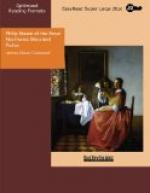At six o’clock he stopped to cook some tea and warm his meat and bannock. After that he traveled until ten, then built a big fire and gave up the pursuit until morning. At dawn he started again, and not until the forenoon was half gone did he find where the doctor had stopped to camp.
The ashes of his fire were still warm beneath and the snow was trampled hard around them. In the north the clouds were piling up, betokening a storm such as it was not well for a man in Philip’s condition of fatigue to face. Already some flavor of the approaching blizzard was carried to him on the wind.
So he hurried on. Fortunately the storm died away after an hour or two of fierce wind. Still he did not come up with McGill, and he camped again for the night, cursing the little professor who was racing on ahead of him. It was noon of the following day when he came in sight of the few log cabins at Fort Smith, situated in a treeless and snow-smothered sweep of the plain on the other side of the Slave. He crossed the river and hurried past the row of buildings that led to post headquarters. In front of the company office were gathered a little crowd of men, women and children. He pushed his way through and stopped at the bottom of the three log steps which led up to the door.
At the top was Professor McGill, coming out. His face was a puzzle. His eyes had in them a stony stare as he gazed down at Philip. Then he descended slowly, like one moving in a dream. “Good Heavens,” he said huskily, and only for Philip’s ears, “do you know what I’ve done, Phil?”
“What?” demanded Philip.
The doctor came down to the last step.
“Phil,” he whispered, “that fellow we found with a broken head played a nice game on me. He was a criminal, and I’ve brought back to Fort Smith no less person than the man sent out to arrest him, Corporal Dobson, of the Mounted Police, and his driver, Francois Something-or-Other. Heavens, ain’t it funny?”
That same afternoon Corporal Dobson and the half-breed set out again in quest of Falkner, and this time they were accompanied by Pierre Thoreau, who learned for the first time what had happened in his cabin. The doctor disappeared for the rest of the day, but early the next morning he hunted Phil up and took him to a cabin half a mile down the river. A team of powerful dogs, an unusually large sledge, and two Indians were at the door.
“I bought ’em last night,” explained the doctor, “and we’re going to leave for the south to-day.”
“Giving up your hunt?” asked Philip.
“No, it’s ended,” replied McGill in a matter-of-fact way. “It ended at Pierre Thoreau’s cabin. Falkner was the third man to work out my experiment.”
Philip stopped in his tracks, and the doctor stopped, and turned toward him.
“But the third—” Philip began.
The little doctor continued to smile.
“There are more things in Heaven and earth, Philip,” he quoted, “than are dreamed of in your philosophy. This love experiment has turned out wrongly, as far as preconceived theories are concerned, but when I think of the broader, deeper significance of it all I am—pleased is not the word.”




